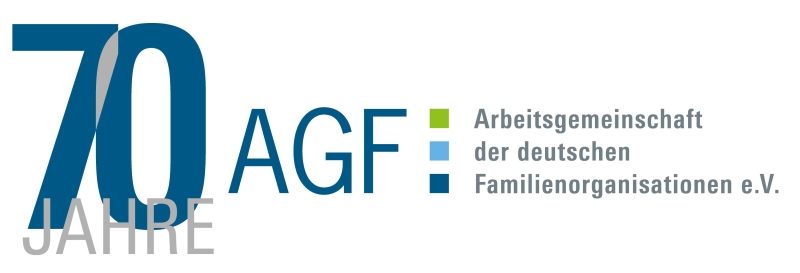On 13 February 2024, the AGF organized an expert discussion on the proposed EU Regulation on the cross-border recognition of parenthood (“Parenthood Regulation”). The AGF organisations discussed this topicwith representatives of the responsible unit within the German Ministry of Justice (BMJ) and Björn Sieverding, president of NELFA – Network of European LGBTIQ* Families Associations.
Background
In her State of the European Union speech, EU Commission President Ursula von der Leyen had announced that the EU Commission wanted to establish a procedure for the mutual recognition of parental status in the EU. This was supposed to ensure that the parenthood of a child in one EU member state is also recognized by the other member states. On 07.12.2022, the EU Commission presented a proposal for a Council Regulation (COM(2022) 695 final). This contains provisions on applicable law, international jurisdiction, rules on the cross-border recognition of parental decisions and the acceptance of authentic instruments as well as the introduction of an European certificate of parenthood. On 14.12.2023, the European Parliament approved the proposal without any significant changes. Representatives of the member states are currently discussing this proposal in the context of the EU Council. The approval of all member states is required for adoption. As there are various points of conflict seen by different states, an intensive discussion process with an uncertain outcome can be expected..
Introduction
Björn Sieverding from NELFA set the scene by describing the problems that parents can currently be confronted with regarding cross-border recognition of their parenthood. He referred particularly to same-sex parents. He continued how the planned Parenthood Regulation could help in these situations and justified the need for an EU-wide regulation as there are differences in the national laws of the member states. In particular children from rainbow families often have difficulties clarifying their legal situation in the case of binational parent couples or when moving to other countries arising from diverging regulations on marriage, parenthood, adoption and reproductive medicine. This leads to complex legal situations, which entail at least a high level of recognition and administrative effort, up to a possible statelessness of the child. The well-known examples of “Baby Sara” and “Ole” are the most prominent examples of this.
Björn Sieverding described the current status of the discussion on the EU Commission’s proposals: The EU Commission is proposing the introduction of a system of rules for the cross-border recognition of parenthood. These include the determination of international jurisdiction, the creation of conflict-of-law rules to determine the applicable national law in case of conflict and the mutual recognition of court decisions on parenthood. In addition, the Commission proposal provides for the introduction of a European certificate of parenthood.
However, the EU Commission’s proposal is under discussion, particularly in the Council. He explained that criticism has been voiced, mainly with regard to possible effects on existing national regulations. This particularly concerns regulations on same-sex marriages, adoptions and the recognition of surrogacy. Those member states being sceptical, suspect that this new regulation could lead to a legalization of parenthood that is not intended by national legislators.
In the view of the controversial assessments, Björn Sieverding emphasized that, from NELFA’s point of view, it is not about introducing new rights for rainbow families at national level. Instead he highlighted that parent-child relationships that are already legal and recognized in one EU state should also be able to exist in any other EU state. Thus, NELFA supports the Commission’s regulatory proposal, as they emphazsie that it ensures the protection of children and their legal relationships with their social parents. Finally, he stressed the importance of a uniform regulation in order to protect children’s rights and create legal clarity in cross-border situations. However, it was also clear from NELFA’s point of view that the draft only solved part of the existing problems.
Discussion
In the discussion, different components and arguments of the general debate were discussed and weighed up in detail. First of all, it was clarified that there already are national regulations on the recognition of foreign decisions on parenthood in the member states. However, the regulation would lead to uniform rules within the EU. It was also emphasized that it was not only same-sex parents are affected, but also other family constellations.
The attendees of the AGF member associations agreed on the fundamental objectives of the Commission’s proposal. For example, the goal to reduce the material and psychological burdens on families caused by very complicated recognition procedures is very much in the interests of families and should be supported. It is also an important goal to protect children’s rights to parenthood and to create legal certainty for families. The attendees highlightes that it was important that parenthood is guaranteed for all children, even if they move within the EU or if their parents have different nationalities.
However, it was reflectd that the effects of the EU proposal and its interdependence with other regulations might be far-reaching. Ultimately, it is a question of who is the parent of a child and therefore indirectly what consequences arise from this parent-child constellation and therefore what rights and obligations result from this. Those regard, among other things, nationality law, maintenance law and inheritance law. As the member states would have to unanimously agree to the regulation, the participants supposed that the negotiations would be both legally and politically complex.
The meeting also included a discussion on the issue of whether the EU proposal could establish forms of parenthood or regulations on surrogacy against the will of national governments. It became clear that direct national legislative sovereignty in these matters would remain unaffected. A state would not be forced to introduce same-sex marriage if the national legislator did not want this. However, the organisations discussed that there can and, if necessary, should be an indirect regulatory effect, as it is in the interests of children to guarantee them and their parents legal certainty for their parent-child relationship. Thus, governments could fear political pressure to legitimize themselves if they accepted parenthood regulations for immigrant rainbow families but ruled this out for their own population.
The question of how the Commission’s proposal will affect the recognition of surrogacy is a major topic of public debate. A AGF member association in beforehand had expressed concerns in this regard. The discussion among the family organisations at the AGF expert meeting was rather critical of the practice of surrogacy. But this question wasn’t the focus of the discussion. Instead, more intensely it was discussed whether and how the current proposal might favor surrogacy. Concerns were expressed that a respective regulation could lead to an indirect support. This was countered by the argument that the EU proposal was only about the mutual recognition of decisions between EU member states. Within the EU, surrogacy was prohibited in the vast majority of member states, anyhow. In some member states, there were only very restrictive regulations that are only open to heterosexual couples with health restrictions and a desire to have children. However, this only applies to a very small number of cases. It was argued that the current regulations on the recognition of parenthood from third countries, of which some might permit commercial surrogacy, were expressly not affected by the EU proposal. Still, concerns were expressed as to how, for example, an expansion of the EU by a country with largely legalized commercial surrogacy would affect future practice.
It became clear in the discussion that a solution to clarify surrogacy would have to be found in the further process that takes into account the concerns regarding intended and unintended effects.
Another question was whether the planned EU certificate of parenthood could make it more difficult to enforce children’s right to know their parentage by “concealing” their biological parentage. However, this was mainly denied, as the accessibility of the information would not change.
Finalyy it was discussed how the EU process can be supported in order to achieve the desired effect of legal certainty in the recognition of parenthood. The current chances of a unanimous adoption of an EU regulation were assessed differently. However, there was agreement that, in view of the important fundamental objectives of the proposal, the critical points must also be openly addressed and discussed. Further complicated negotiations at Council level were generally expected and a quick adoption was seen as rather unlikely.

